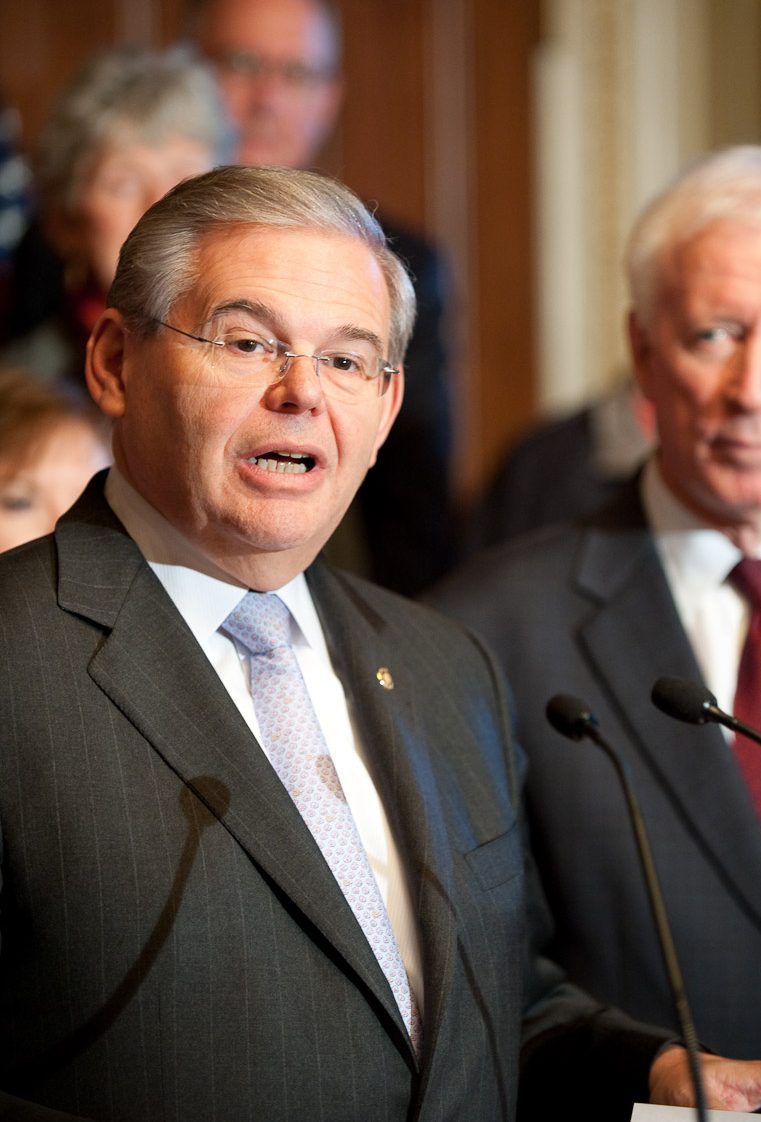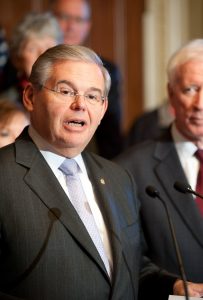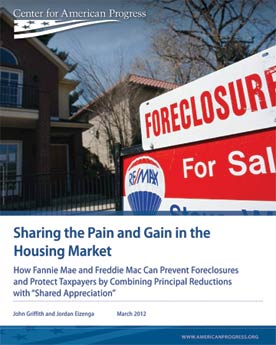In February 2012, on the heels of $25 billion attorneys general mortgage settlement, Sen. Robert Menendez unleashed the Preserving American Homeownership Act, a bill that would help eligible underwater homeowners by creating a program where banks reduce mortgage principal in exchange for a portion of the increased value of the home over time—shared appreciation mortgage.
The bill was timely because it mirrored Ocwen Financial’s loan modification program, Shared Appreciation Modification, that creates equity by writing down an underwater borrower’s principal balance to 95 percent LTV. In this interview, Shelterforce talks with Menendez, (D-NJ), who serves as chairman of the Senate Banking Committee’s subcommittee on Housing, Transportation, and Community Development, about this initiative, the ongoing federal response to the housing crisis, the Sustainable Communities Initiative, the Occupy movement, and more.
Shelterforce: You have long been a supporter of the idea that the GSEs should conduct principal reduction for underwater and at-risk homeowners to keep more people in their home and actually reduce the loss to the taxpayer. But as you know, of course, FHFA has been really resistant to that, and that’s been coming to the fore lately, and it’s gotten sort of political. How do you see a path forward toward moving principal reduction along in the current environment?
Sen. Robert Menendez: I think we need to keep the heat on to make that happen and one of the things that we have to deal with is the regulatory process, how banks get treated if they do the principal reductions that we want them to do, and how the reduction takes place.
I also introduced a bill in February to make shared appreciation mortgages more globally available. This is where the loan is written down to 95 percent of loan to ratio value and where, in return, the lender, for reducing that amount of the original loan, will get a percentage of any increase in appreciation. So it incentivizes them to write down the loan now when people desperately need it and take the risk. There might be appreciation, there might not be appreciation. But if there is, they’re going to get part of it in return for the principal amount that they reduced.
So I think we need to do a series of things, both on the regulatory side, on the incentive side, and to continue to push. We’re also waiting to see how the attorney’s general settlement with the country’s largest mortgage servicers plays out because lot of that money will go to principal reduction. While there are many people who believe that the settlement was insufficient, we look forward to seeing a scenario where that money could be used for loan reduction.
We recently did an interview with the CEO of Ocwen, and they’re carrying out a shared appreciation mortgage program that’s similar to yours. Do you see the fact that a private vendor is engaging in this as something that might help make the GSEs more comfortable with it?
Menendez: I think so. Ocwen was actually the genesis of some of this idea. Of course, they’re doing it in the private sector within a limited universe. I want to dramatically expand that universe.
It seems to me that the GSEs would look at it and be able to say, “Well, we still have an opportunity to recuperate a significant amount of principal” at the end of the day by having a percentage of future appreciation recaptured, and therefore strengthen their portfolio.
My argument to the GSEs and the conservator, who I think has had a very narrow view of conservatorship, is that when a house forecloses, how much don’t you lose. And if you’re going to take that write-down, then why not take a write-down that, at the end of the day, keeps families in their homes?
Exactly. You mentioned potential regulatory help in terms of the principal write-down. Do you have specific ideas in mind of things that would help move that forward?
Menendez: Part of the challenge for the banks is that, if they write down significantly large parts of their portfolio in the mortgage market, their rating with the regulators is affected. And so it’s almost like “Let me keep the property on the books because for so long as I keep the property on the books, I can have it at the value that I lent at or it was appraised at.”
First of all, that’s unrealistic because, obviously, values have changed. Second, it’s unrealistic for the regulators to insist that they recapitalize to the extent that they go ahead and make principal reductions, when, in fact, we all know that those would be write-downs anyhow. So finding the right balance as to how do we allow the principal reductions to take place, but not penalize the banks for doing so is the access that I’m trying to find, that intersection that accomplishes both of those goals.
It seems to me that it’ll have to have some regulatory review that says that a certain percent of overall write-down does not trigger a recapitalization, because otherwise the bank not only wouldn’t take its losses, but that it would also have to seek new capital just to be in the present status position they’re in. That’s not exactly an incentive for them.
Do you think the special mortgage investigation unit headed up by New York State AG Eric Schneiderman could quell some of the concerns that the AG settlement didn’t go far enough? In what way would you like to see it have an impact?
Menendez: The president’s effort is to ensure that those who violated the existing law get prosecuted and I think this would send a clear message to the marketplace.
Shouldn’t this have happened sooner?
Menendez: Should it have been done earlier? Yes. I mean, I certainly would have liked to have seen it done earlier. I think the administration was totally consumed with dealing with the consequences of what happened more so than the causes in the first instance, but I’m glad that the president ultimately got to it.
Will this tie in in any way with the OCC’s foreclosure review program that you’ve supported recently?
Menendez: I really don’t know for sure, but I think this unit has a lot more to do with the securitization aspect of what transpired and some of the mortgage products that transpired, but I’m not sure how far it goes beyond that or how it’s going to interface.
The Sustainable Communities Initiative, whose funding was taken away by the House in fall 2011 but then later restored by the Senate in April 2012, has been one of the highlights of the administration’s work at bringing different agencies together. It builds on things that we in the field all know: that communities work much better when housing and transportation and environment are considered together. Can you talk a little bit about that partnership?
Menendez: I introduced the Livable Communities Act of 2011, which is the bill that would authorize the HUD Office of Sustainable Housing and Communities and its regional planning and community challenge grant programs. These grants basically support community efforts to establish and help implement locally defined goals for future growth and redevelopment through some comprehensive planning and capital improvement programs.
As the chair of the of the Senate’s Housing, Transportation, and Community Development Subcommittee of the Banking, Housing, and Urban Affairs Committee, I’ve pushed for more transit-oriented villages and development and look at existing infrastructure. So I’m a big supporter of it.
If HUD’s involvement had been defunded, I think it clearly would have hobbled the ability to achieve the goal of sustainable, livable communities, because HUD is an important segment of that. And this is clearly a target of members of Congress who are of the view that the private marketplace will figure it all out, and helping communities plan for sustainability is something that is not a federal role.
Finally, the stronger the advocacy there is for this, the more it sustains its ability to exist and to grow. The weaker the advocacy for this in contrast to other things, then the more likely it faces elimination. And so that’s part of our challenge here. It’s an everyday battle. I just helped write a letter from a group of about 25 Senators to appropriators asking that Livable Communities grants be funded, so hopefully that will make a difference.
As you travel around New Jersey and the rest of the country, have you seen affordable housing, community revitalization, or neighborhood stability projects or programs that you think are worth replicating? What can the federal government could do to support those?
Menendez: In New Jersey, and particularly in Hudson County and the New York metro area where I live, I look a lot at how we have housing and commerce alongside mass transit, which means you can take a trans-Hudson crossing to work or to a hospital, or you can take a north-south high-speed light rail system to any of the opportunities there. Further south, you see that New Brunswick has done some good work.
My goal is to incentivize this type of planning instead of continuing to have more suburban and exurban sprawl and stop developing on our open spaces. How do we come back to the very essence of what in my mind, at least for me, is a livable community where I can grow, nurture my family, live safely and environmentally desirable, and have access to whatever my needs are in terms of transportation, education, healthcare, and economic opportunity. How do we do this and maximize on the infrastructure that already exists.
This is why I introduced the Livable Communities Act, Choice Neighborhoods Act. It’s all an effort to move us in that direction. From a federal perspective, we have to get more people engaged in that type of thinking.
And I was visited here not too long ago by some of the advocates for this type of thinking—the American Planners Association, among others—and had one or two Republican mayors from different parts of the country who are actually advocates of this view. And I told them that they could be playing an extraordinarily powerful role if they could get some of my colleagues to appreciate that this is not a question of costing money. On the contrary, at the end of the day, we may very well save money. We will stop sprawl. We will have a better environment. We will have greater quality of life. And we can more robustly pursue economic opportunities. Those should be universal goals, not just Democratic or Republican goals. They should be universal goals.
Given the current economic situation, there is clearly a need for affordable housing for low- and moderate-income people. In New Jersey, just like everywhere else, the state government has pulled back on affordable housing funding. What are some of the opportunities and challenges not only for New Jersey, but for around the country as well?
Menendez: We desperately need affordable housing because you cannot have the workforce that our companies need, the human capital that our companies need, in order to succeed unless you have the affordable housing for those families to live in. And if you don’t have the human capital you’re not going to attract the type of companies that would create economic opportunity and job growth in our state.
Very often, when I speak to major companies contemplating coming to New Jersey, a big part of what they talk about is human capital and the workforce. Well, that workforce needs a place to call home. So there’s an imperative on the human side for a community to have affordable housing, and there’s also an economic imperative as well.
I’ve seen actions taken in the state that make me wonder about the commitment to affordable housing by Gov. Christie and his administration. From a federal perspective, we seek to continue to try to enhance the various programs that have fed in to create affordable housing. That’s part of the challenge we have here—being able to try to grow the HUD budget, particularly in affordable housing, is a consistent challenge here.
There’s a narrative that says that cause of the financial crisis was Fannie and Freddie forcing banks to give mortgages to poor people who couldn’t afford homes…
Menendez: Oh, that’s ridiculous.
It is, but it gets a lot of attention.
Menendez: I know. I have in the Banking Committee several battles with the Republicans who say that. And I’ve had Chairman [Ben] Bernanke before the committee, and I have always questioned him on that because the Federal Reserve did a study on that and disproved that. And so while Fannie and Freddie need to be reformed, we need a Fannie and Freddie in the marketplace, otherwise, we’re not going to get home ownership as a reality.
Second, what happened with Fannie and Freddie is that they followed the market, but they didn’t drive it, in my view.
Right. So the big lie has such power when it’s repeated over and over. You mentioned the Tea Party earlier, and their mantra was “Cut spending, cut taxes. Cut spending, cut taxes,” and some might call that “slash and burn.” The Occupy movement seems to have introduced something else, fairness and income equality, the 99 percent and the 1 percent. What do you think that’s going to do to affect the narrative, moving forward? Is this a good thing that they’ve done?
Menendez: Well, look, I think they clearly have struck a responsive chord in American society in which the question of inequality, which I have raised several years ago and said, if we continue on the path of rising inequality, we will feel challenges in our country that we have only read about in other countries in the world. And that has actually come to fruition sooner, not totally as I thought, but sooner than I thought.
If you listened to the president’s State of the Union address, certainly he has driven the issue to a new level, because there’s nobody in this country who has a bigger megaphone to talk about something than the president of the United States. And so it seems to me that fairness, as we look across the spectrum of public policy in this country, whether we are talking about fairness in the housing market, fairness in our tax policy, or fairness in the distribution of federal resources, I think the issue of income inequality is something that is likely to be with us now as part of the fabric of all the public policy discussions moving forward.
Thanks.






Comments